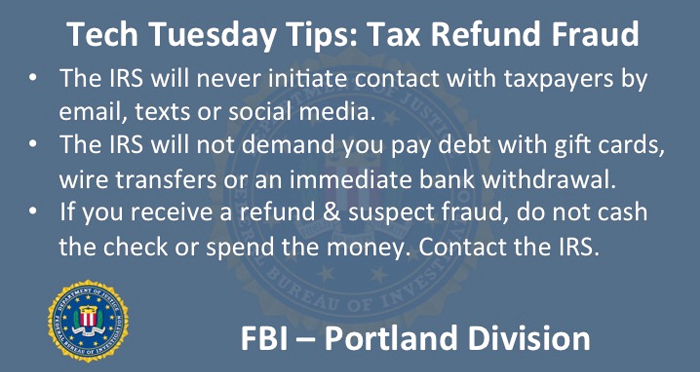The IRS recently warned about a new scam in which a fraudster steals client data from a tax preparer, files a return and then has the money deposited in the legitimate taxpayer’s real bank account. The fraudster then calls the taxpayer saying the refund was deposited in error and threatens to send the matter to a collection agency if the taxpayer doesn’t “return” the money by sending it to the fraudster.
In another version of this refund scam, the IRS warns that some people are getting calls accusing them of committing fraud. The taxpayer is threatened with criminal charges, an arrest warrant and the “blacklisting” of his Social Security number if he doesn’t immediately return the refund. Of course, the scam artist ensures that the “return” ends up getting routed to his own bank account.
If you do receive an erroneous check or refund in your account — don’t spend that money. Check with the IRS to determine the appropriate way to report the ID theft and to return the money.
Another tax scam to watch for involves phony calls from the IRS targeting vulnerable populations — particularly new immigrants. The callers may spoof the phone number to make the caller ID appear to be from a real IRS office, and the fraudsters often approach the victims in their native language if they have limited English proficiency.
Victims are told they owe money to the IRS and must pay right away to avoid arrest, deportation or suspension of a business or driver’s license. The caller often suggests the victim pay the fake debt with gift cards or wire transfers. In some instances, they will demand the victim’s credit or debit card number over the phone to settle the debt immediately.
The most important thing to know is that the IRS will never initiate contact with taxpayers by email, text messages or social media. IRS officials will not call to demand immediate payment, nor will they demand that you pay without the opportunity to ask questions or file an appeal. If the IRS is trying to collect a debt or audit you, they will always attempt to contact you by mail first.
If you have any questions about a suspected fraud, contact the IRS.
If you have been victimized by this online scam or any other cyber fraud, be sure to also report it to the FBI’s Internet Crime Complaint Center at www.ic3.gov or call your local FBI office.





